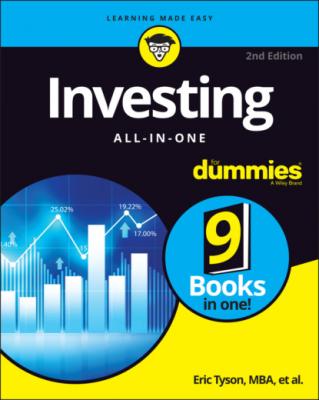Investing All-in-One For Dummies. Eric Tyson
Чтение книги онлайн.
Читать онлайн книгу Investing All-in-One For Dummies - Eric Tyson страница 37
 more than 20 percent or so.
more than 20 percent or so.
Some 529s offer target-date-type funds that reduce the stock exposure as target college dates approach so you don’t have to make the adjustments yourself.
Securing Proper Insurance
Although many people lack particular types of insurance, others possess unnecessary policies. Many people also keep very low deductibles. Remember to insure against potential losses that would be financially catastrophic for you; don’t waste your money to protect against smaller losses.
Consider the following types of insurance to protect yourself, your loved ones, and your assets:
Major medical health insurance: You need a policy that pays for all types of major illnesses and major medical expenditures. If your financial situation allows, consider taking a health plan with a high deductible, which can minimize your premiums. Also consider channeling extra money into a health savings account (HSA), which provides tremendous tax breaks. As with a retirement account, contributions provide an up-front tax break, and money can grow over the years in an HSA without taxation. You can also tap HSA funds without penalty or taxation for a wide range of current health expenses.
Adequate liability insurance on your home and car to guard your assets against lawsuits: You should have at least enough liability insurance to protect your net worth (assets minus your liabilities/debts) or, ideally, twice your net worth. If you run your own business, get insurance for your business assets if they’re substantial. Also consider professional liability insurance to protect against a lawsuit. You may also want to consider incorporating your business.
Long-term disability insurance: Even if you don’t have dependents, odds are that you’re dependent on your employment income. What would you (and your family) do to replace your income if a major disability prevented you from working? Most large employers offer group plans that have good benefits and are much less expensive than coverage you’d buy on your own. Also check with your professional association for a competitive group plan.
Life insurance, if others are dependent on your income: If you’re single or your loved ones can live without your income, skip life insurance. If you need coverage, buy term insurance that, like your auto and home insurance, is pure insurance protection. The amount of term insurance you need to buy largely depends on how much of your income you want to replace.
Estate planning: Most folks need a simple will to delineate to whom they would like to leave all their worldly possessions. If you hold significant assets outside retirement accounts, you may also benefit from establishing a living trust, which keeps your money from filtering through the hands of probate lawyers. Living wills and medical powers of attorney are useful to have in case you’re ever in a medically incapacitated situation. If you have substantial assets, doing more involved estate planning is wise to minimize estate taxes and ensure the orderly passing of your assets to your heirs.
For all the details on the best and most effective ways to buy insurance, what to look for in policies, and where to get good policies, see Personal Finance For Dummies by Eric Tyson, MBA (Wiley).
Chapter 4
Starting Out with Bank and Credit Union Accounts
IN THIS CHAPTER
Customer visits to stand-alone bank branches with a lobby and tellers are going the way of the big-city newspaper business. Both are in decline and in industries that are being disrupted by the internet.
Who needs retail banks, with their costly-to-maintain branches, when you can do your banking online? You can conduct most transactions quicker online, and it saves the bank money, which enables it to offer you better account terms. And there’s no need to rush out at lunchtime to be sure you make it to your bank during its limited open hours. Online banking is generally available 24/7.
But here are even bigger questions for you to consider: Do you even need a bank account? What are your best alternatives? That’s what this chapter explores.
Everyone needs an account or two from which to conduct transactions, including paying bills and storing newly earned money. Such foundational accounts are essential to get in order before proceeding with investing that has the potential to produce higher returns.
Understanding FDIC Bank Insurance
What makes keeping your money in a U.S. bank unique is the Federal Deposit Insurance Corporation (FDIC) insurance that protects bank deposits. If your bank fails (and as history shows, some banks do fail), and if your bank participates in the FDIC system, your bank account is insured by the U.S. government up to $250,000. The stamp of FDIC backing and insurance is soothing to some folks who worry about all the risks and dangers in the investment world.
While the FDIC insurance is worth something, banks have to pay for this protection. That cost is effectively passed along to you in the form of lower interest rates on your deposits.
FDIC backing is hardly a unique protection. Every Treasury bond is issued and backed by the federal government, the same debt-laden organization that stands behind the FDIC. Plenty of other nearly equivalent safe lending investments yield higher returns than bank accounts. Highly rated corporate bonds are good examples (see Book